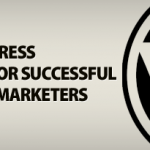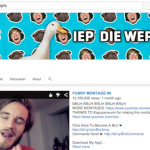
How To Create Your Own WEB TV Show
As I was thinking about my introduction for this interview I am once again reminded of what a huge influence Yanik Silver and his Underground Online Seminar have been on my life.
You see, today’s guest – Mr Andrew Lock is yet another person I met via Yanik way back in 2006. Andrew has gone on to become a good friend and mentor and is frankly one of the nicest people you are ever likely to meet in the Internet Marketing space. We cover such a lot in this interview but one thing in particular that stands out in Andrews reply is his response to ‘the best business advice he has ever been gave”
The best advice I’ve ever been given is to look at what other people in your industry are doing and do the opposite
That pretty sums up Andrews whole approach to business.
Andrew is English but now lives in beautiful Utah where he recently launched a new Web TV Business which follows on from his hugely successful and No1 unconventional Marketing Web TV Show: Help My Business SUCKS! If you have never seen Help My Business SUCKS! then go check it out – in only 10 minutes each week Andrew cranks out the best business TV I know – it is just about impossible to watch and not pick up something useful. And I say it again – it is only 10 minutes!
In particular look out for Andrew’s Nifty Clicks feature on the show. One of the reasons Andrew is hugely successful is because he leverages little known web tools and resources, many of which are free to get thinks done quicker and easier – which Andrew refers to as Nifty Clicks. Indeed Andrew has created a website around the theme of introducing people to these unusual and powerful resources at http://niftyclicks.com
One other thing I should say about Andrew is that he knows a lot about about A LOT OF THINGS – he is also an Ebay Expert for example and runs a print Newsletter called Microwave Marketing but today we are going to focus on Video and WEB TV.
I have been keen to learn more about Web TV for some time, who knows, perhaps there will be an Income Diary Web TV show one of these days. What I am certain about is that when it comes to finding out how to create a Web TV show Andrew Lock is the man to follow and I do consider myself hugely blessed to know Andrew both as a friend and as a mentor.
Thank you Andrew.
Enjoy the interview everyone and as always I do look forward to your comments.
Michael
PS: Are you using Video on your blog? Would you like to see more video on this site?
[audio:http://www.incomediary.com/rec_andrew.lock_12_Nov_2009_19_00_04.mp3]Andrew Lock Interview
Interview Transcript:
Michael: Thank you for joining us today Andrew – my first question is, should people be using video on their websites?
Andrew: Oh, absolutely. Video is more engaging for most people than written content, or even audio. Obviously, involves more senses and anyone that I’ve spoken to that is using video really has benefited greatly from adding it to their sites.
There’s a reason why YouTube has become so successful. It’s a great opportunity, because we’re sort of at gold rush time where previously, the technical constraints were a problem with the small, postage size video.
And also the cost implications were a barrier to, because you used to have to host videos yourself, and the bandwidth cost were just outrageous. So those two hurdles have been overcome now. So there’s no excuse for anyone not to have video on their site.
Michael: Great. And what’s the best way for everyone to start using video on their websites or their blogs?
Andrew: Well, it can be as simple as simply hooking up a webcam to your computer via a USB port. [coughs] Excuse me. Something like Logitech or Creative make good quality webcams. You want 640 by 480 resolution, with the capability of doing 30 frames a second. That basically is near TV resolution and quality.
And, the latest webcams are really good quality. So, once you have that hooked up, it’s as easy as going to YouTube, creating a free account, pressing the record button, and you can actually record directly into YouTube. So there’s no software really to worry about. And that’s the most basic way of doing it. But, you can build up from there. Maybe get a higher quality camera.
Something like a Flip or Kodak Z i80 is a really good one. That has a microphone. And beyond that, then you’re into the whelm of more traditional camcorders that record, many of them to these storage cards like SD cards, that kind of thing.
So you don’t really need to spend a lot of money. The main thing, of course, is that you have something worthwhile to say. And preferably something that will help other people rather than pitching them, or trying to sell them.
Michael: Yeah exactly. And you just mentioned YouTube. Do you think YouTube is the best place to go for publishing your videos or any other sites? Or just do it your own way, a custom player.
Andrew: Yeah, it’s a good question. YouTube is a good place to start up, because it’s so easy. I don’t recommend people rely on YouTube, because the problem with YouTube is, because it’s the biggest site, finding good quality content. It is there, but it’s really buried. It is like trying to find a needle in a haystack, unfortunately.
So YouTube is a great place to learn the ropes, because it’s very easy. Once you are a bit more comfortable with the technology and being in front of the camera and so on, then I suggest that you go to a more specialist site. And some really good ones are viddler.com, Blip.tv, revver.com and Veoh.com.
And all of those types of sites attract more, what I call episodic content, more quality content that is regularly released. The term podcast is an old fashioned word really, but that’s really what it is. It’s regular content.
Those types of sites really love that content. And people are finding out they can watch better quality content on those sites compared to YouTube.
Michael: Oh great. And with regard to driving traffic, because I have created a few of my own videos myself and I’ve sent them out. And they have bought me traffic. Is there any advice you give to bloggers in particular, using videos to drive traffic to their website?
Andrew: It’s easier than most people realize, really. A couple of things that are important are: First of all, every one of the sites that I mentioned allows you to not only include your URL in the notes that go with the video, but they also allow you to include keywords and a description.
So, I see a lot of people make the pretty obvious mistake really, of ignoring those things. Maybe they’re in a rush to get the video up, and they’re really losing out on a lot of potential traffic, by not just taking five minutes to add the keywords, to add the URL, and to add the description. Because all of those things, obviously are going to help you get found.
Not only in the individual video websites but also with Google. Because Google loves video. It really does. You can see that by the way that Google ranks results.
The other thing that you need to do is to include your URL in the actual, when you make the video. So, you might start by saying:
“Hey, this is Michael Dunlop from , and today I’ve got a quick tip for you about X.”
And again end up, finish the video in the same way.
“I hope you enjoyed that tip. Again, this was Michael Dunlop from .”
And lets say you started and ended with your URL.
That’s never perceived as a pitch. It’s just stating who you are. But it’s important to include that, obviously. Cause you want to make it easy for people to find you, especially if they really respond and like the content that you’ve given them.
Michael: All right. That seems like a no brainer to me. That’s good advice. I hear you’re quite successful with iTunes. I believe you’re one of the top ones for entrepreneurs, if not the top.
Andrew: Yeah, yeah. Help My Business SUCKS! is currently number one for entrepreneurs, above Harvard Business, Business Week and Advertising Age. Which is some big companies. And really, that should give people confidence, that you can, as an individual, create something that really people respond to very well and want to seek out and watch.
By comparison, here’s me, this one guy producing this show on a daily basis, that’s got to the top of the ranking on iTunes. Compare to these huge companies with virtually unlimited resources, there’s no comparison.
But, I believe what I did different is I created content that is very practical, and it aims to not only educate but also entertain.
Most people’s content is quite dry and boring. Even if it’s good content, it needs to be presented in an unboring way, a lively presentation, and a way that…
You know, just like you watch with regular TV, think of the shows that you like. Usually there’s some form of entertainment value in there, it’s not just pure education, because most people don’t like that, professor style of learning. It sends shivers down most people’s spines and then they compare it to college or university, that kind of thing.
So those are the reasons, I think, that my show’s become very popular, and I’m delighted about that, of course.
Michael: I have watched quite a few shows myself and you do a very good job at putting together a video show, I have to admit.
Andrew Lock: Yes, I’ve learnt a lot from Gary Vaynerchuck, who I know you’ve interviewed on the site too, and Gary was very helpful to me in the early stages of putting the show together, gave me some good tips.
And I watched his show, I watched some other shows that were out there at the time. There wasn’t many, to be honest, but I just tried to learn from what other people were doing and put my own spin on it too, so I didn’t want to become a clone of Gary Vaynerchuck or any other show.
Again, that’s another mistake that people make. You need to be yourself, you need to be real and a true representation of your own passions and interests. Don’t just try and copy someone else.
Michael: Exactly. I do see people copy myself, my websites before, but also I see people copy everyone. I mean, I guess to some point it’s good to copy because it’s obviously proven to show results.
But when it’s your own passion and your own personality, there’s no point being someone else, because you’re not being true to who you are, I guess. So I’d agree with that.
Andrew: Yes, copying ideas from other sites and video content and so on, it’s fine. The way I liken it when I talk about examples on my show is for people to adapt what they see, not directly adopt it. It’s not about just copying everything word for word or the exact style or so on, it’s taking the principles behind it.
And if you look at your site, for example, that very nice, clean layout that you’ve got on the home page there, nice design, it’s very easy to see what the site is about, that is the lesson that people should take away from the site.
They shouldn’t just go and create a carbon copy of that site. I mean that’s not only lazy but it also doesn’t separate themselves from what other people are doing. They need to put their own brand spin and style on it, but just understand the principles. That’s what is beneficial.
Michael: I couldn’t agree more. Now I do understand you monetize your videos themselves. Not many people really think about the fact that they could actually monetize a video. They know they can monetize a blog in most of the traditional ways, but would you like to quickly explain how people could monetize their videos?
Andrew: Well, again it’s easier than most people realize, and I was at one of the trade shows for new media, new media expo, I think it was Blog World, a few weeks back, and the majority of people there weren’t making any money.
They were either doing it as a hobby, which is fine, or they in most cases they wanted to make money, but they just didn’t have any idea about how to do that.
So with my site, there’s actually numerous ways that we generate revenue and the interesting thing about that is that most people, when they watch the show, make the comment to me, “Love the show, but how do you make money from it?” And that’s a really… I always enjoy it when they ask me. That means I’m doing a good job of monetizing it without making it overly hype or sales.
And one of the things that we do is we have a sponsor for each episode, which is a product or service that I have personally used and benefited from and in some cases they approach me, in other cases I approach them. I tell them about the show, I tell them who the demographic is, that it’s 100% entrepreneurs, it’s a very good fit for their audience. So that’s one method.
When I mention resources and tools that are available on the show, if there’s an affiliate link available for those, then I use the affiliate method. I have shows that lead into webinars and in the webinar, I provide content which ultimately, at the end of the webinar I sell some kind of course or system or guide, that kind of thing. That’s another way of generating revenue.
I offer reports or ebooks within the show. That’s another way of generating revenue. And there are lots of other ways too.
So, you’ve just got to be creative and try and maintain the quality of the content and material and you never want it to get to a place where people believe that it’s more about pitching than it is about content. It should always be subtle.
So one of the subtle ways that I use, for example, is when someone writes in a question for me to answer on the show in a segment called ‘Ask Andrew’, when that question is answered on the show, I reward that person and I actually tell viewers on the show.
I say something like, “In return for asking the question, Bob Smith wins three issues of my popular training program ‘Microwave Marketing’, which gives you ready-to-use marketing recipes that you can use in any business.” That kind of thing.
And so it’s positioned as a prize for the person that asked the question, but in giving the prize, I’ve also promoted the product. So that’s one example of how to do it in a non-confrontational way, in a very low-key way that still promotes the product.
Michael: Yes, brilliant advice. I particularly like the sponsor idea. Actually heard that one from somebody recently mention your site and that’s how you make some money.
Andrew: Yes, well, it works.
Michael: I will be using that, I’m starting my own video series for a web design site I have.
Andrew: Good, good.
Michael: So that’s cool. One thing I’m sure a lot of the listeners today, or readers, will be thinking to themselves, “But I don’t look good on camera.” Or, “I’ll get nervous, ” or something like that. What would you say to them because that’s me as well?
Andrew Lock: Well, first of all, I wouldn’t worry about looks. I mean, I’m far from being an airbrushed-type celebrity, but really, that is the point, is that generally people…
If your content is good, people really respond well, because they see you as real and likeable and personable and that’s really an edge that you can get with web TV in comparison to traditional TV.
Because really your positioning is that you are an expert advisor in your field, you’re not an airbrushed celebrity who’s just reading lines off of a teleprompter that someone else has written.
Not everybody is going to like it but that’s fine. But to the people that do like it, they will not only like it, but they’ll love the content. They’ll realize it’s not about what you look like. It’s about what you can provide for them. That works really well.
In terms of being comfortable in front of the camera, like anything it’s a skill that can be learned by anybody. I’m definitely not the most outgoing person. I, traditionally, was the person behind the scenes with TV production. It’s only been in recent years that I’ve stepped in front of the camera.
It is something that you will get better at the more you do it. So start as soon as possible, do some test videos, get comfortable in front of the camera. The more you do it, the better you will become.
I think beyond that, the thing to say is that, in the grand scheme of things, really what we’re doing is quite trivial. There are big issues on the world scene and in the news, and so on, that are critically important, but what we’re doing really is a frivolity, regardless of what industry we’re in.
We want to help people, but, at the same time, we shouldn’t take ourselves too seriously
You’ll notice, with my show, that [Michael laughs] the occasional slip and stumble with what I say, I tend to just move on from it. I acknowledge it and then move on. I don’t try and be word perfect. That, I think, is the right thing to do for this type of medium.
I think it’s wrong to become overly slick and polished [Michael laughs]. Because, yeah, you lose that sense of being real. Does that help?
Michael: Oh, yeah. That’s actually quite true, because when I started just doing audio, myself, and video, if I had to get it perfect, I’d have never completed anything [laughs].
Andrew: Right-right.
Michael: So you’ve been doing your video blog for – it must be coming up to two years or…
Andrew: Yeah-yeah.
Michael: … one and half years now.
Andrew: That’s right.
Michael: If you could go back, time machine, say it existed, what would you do differently?
Andrew: Oh, good question. I think I would try not to worry. Like you just said. I would not worry so much about getting it perfect, which I did tend to do in the early days. So that’s something I’ve learned. Better to be prolific than perfect.
I think, also, I would have had a clearer structure in place for creating the show. That evolved over time. I’m a lot more organized with it, now that I’ve done on to the 80s. 82, I think, was the last episode.
I don’t really have any major regrets or changes about it, because I’ve tried to be quite methodical with it. Those are a couple of things that I would have done a lot different.
Michael: Great. The next I want to talk from is Nifty Clicks.
Andrew: Yeah.
Michael: I’ve always enjoyed them [Andrew laughs]. You’ve done a couple of sessions of them at the underground. Do you want to quickly just tell us what the Nifty Clicks is about and if you have any good shares for bloggers.
Andrew: Yeah, well, I have to say that I can’t claim credit for the name. It was actually our good friend, Ryan Lee, who helped me come up with the name in a mastermind session. I was stumped.
I described what I wanted the name for and it’s these unconventional, little-known, underground, web tools and resources that enable you to be more productive or get things done more easily, to “systemize” certain aspects of business, that kind of thing.
Within that realm of these resources that I seem to have a knack for covering, I wanted a name for that segment of the show. Ryan helped me with that and came up with the name Nifty Clicks. Which I loved. It’s a good way to brand those resources.
So there was a lesson there in that. In that, it’s good to break a show into segments and have catchy names for each segment, which I’ve tried to do with my show. If you watch that, you’ll see how those segments are broken up. So, yeah, that’s Nifty Clicks.
What happened was, I thought that people would respond well to the show. It’s actually become one of the most popular segments of the show where I reveal a resource each week that most people aren’t aware of. As the show evolved, over the first six months or so, because that section became so popular, I basically did a spin-off.
I created a membership site called niftyclicks.com, where I not only added all the nifty clicks that I’d talked about on the show, but I had – it’s a continuing process all the time – hundreds more of the ones that I had discovered. I had them made into videos and they’re categorized.
If you go to niftyclicks.com and you look at the categories on the left hand side, there are all kinds of areas. There are Nifty Clicks that can help people with multimedia tools, outsourcing tools, productivity resources, resources for public domain, for research, for social media, travel, all kinds of things.
Basically anything a business owner needs to help create and run their business.
So that’s been phenomenally popular. Again, going back to what we were saying earlier, I managed to promote it in a very soft sell way, by saying within the show, I share a Nifty Click for that week and then I say, “If you like that Nifty Click, then you’ll love niftyclicks.com, which is site where I explain hundreds of other web tools and resources.”
That’s how it was born. It’s made itself into a nice little membership site now. Every time I mention Nifty Clicks on every episode, new people sign up, without me having to pitch it.
Michael: Oh, that’s great. That’s really cool. Is there any Nifty Clicks, in particular for bloggers, that you’d recommend?
Andrew: For bloggers, yeah. Let me think. I’m always discovering new ones. There was a plug-in, recently, that I discovered that I liked. I’m trying to remember the name of it, now.
There’s a plug-in called WordPress Wassup, and that has the ability to see real-time stats for your WordPress blog. So you can actually get this really fancy graph where you see where people come from and what the visitors look like in real-time. That’s a pretty clever one.
What else? The themes that you like are the ones that I recommend too. I forget the name of them now. The ThemeForest?
Michael: Oh yeah. I use ThemeForest.
Andrew: I really like those, think they’re excellent. What else? Let me see here. Trying to remember. The “at this” again is a really good one and the “share this” plug-in too, to enable people to easily use the service that they wanted to recommend the site to others.
And I like that particularly because, previously… I listed all of the different options down the site and it just made it very cluttered so by implementing “share this” it’s just one button, and that enables people to share the site in whatever way that they, whatever method they use, whether it’s Stumble Upon, or Digg, or whatever they like.
Oh another one I came across recently is called Apture. Are you familiar with that?
Michael: I have heard of that yes.
Andrew: Yes. Apture is really good. It allows you to add multimedia elements to your website. It’s a little difficult to explain, but if you go to Apture.com I think it’s a free plug-in, and yeah it’s pretty cool because it can add some multimedia elements to any post very easily so I like that one.
Michael: Great. We’ve pretty much discussed everything involved in putting together the videos and monetizing it and bringing traffic to your site. What’s your top tip for those out there who are doing their own web TV show or their own video blog? What’s the most important thing for them to know?
Andrew: I think the most important thing overall is to do it on a subject that you’re truly passionate about. You know that might sound obvious, but the fact is that a lot of people are creating blogs and video content in areas where they are only in it because they think that there’s money to be made.
Michael: Exactly.
Andrew: Yeah. It’s really, that’s a recipe for disaster, because you are just not going to be fully into it and that’s going to come across in the content, whether it’s written or video content and you’re not likely to stick with it over the long term.
So in the long term it’s not going to be a profitable venture anyway. So if you want to build a solid business always construct it around the subject that you are truly passionate about and then it won’t be a job, it won’t be work, it will actually be enjoyable for you to do. It’ll almost be like doing a hobby.
Michael: I completely agree. So many people, especially in my niche in particular because it is about making money, teaching people that, so many people take my resources and then think, “Hey, should I teach this myself?” Because obviously I am doing an all right job myself. So, there’s a mistake a lot of people make.
And I do recommend to everyone listening right now, you have to go with your passion. Wherever you have a great interest in, go for that. As long it’s not like bottled water or something, because you are not going to make too much money with that.
But hey, to end this interview, I have a few quick, five questions. What did you like most about the Internet?
Andrew: What do I like? The ability to find amazing content from intelligent people on literally any subject.
Michael: All right. I hear that. What did you like the least about the Internet?
Andrew: The least is the way that it’s misused by people, the obvious ways that we don’t need to expand on. But, it seems like every positive invention or so is used for negative ways, so that’s a sad, sad part.
Michael: Yeah. And what’s the best advice you’ve ever been given?
Andrew: Oh that’s a good question. I think the best advice I’ve ever been given is to look at what other people in your industry are doing and do the opposite. In other words, don’t follow the crowd, go in a different direction and by doing that you’ll stand out from the crowd and get noticed.
The best advice I’ve ever been given is to look at what other people in your industry are doing and do the opposite
Michael: Yeah. That’s cool. And last question, who do you look up to or model yourself on if anyone?
Andrew: I try and learn from everybody. I read a lot of books, especially business books. I like stuff from Dan Kennedy. I think Seth Godin has some good materials. I loved the book by Dan Ariely called Predictably Irrational
Excellent book about… it’s more from the psychology of selling but very easy to read, style.
Michael: All right. Thanks very much Andrew for this great interview. Would you like to share anything before we leave? Perhaps you’d like to tell everyone about your recent launch, GotBiz.TV which I am sure is great match for all of my readers.
Andrew: So GotBiz.TV is a new web TV network which we just launched. It’s still in a beta phase. But anybody can go to that site and I liken it to being the Hulu for entrepreneurs. So, I don’t think you can access Hulu actually in the UK can you?
Michael: No. I have read up on it myself.
Andrew: Yeah. There are probably similar sites that are around or that will be launched in the UK but what we’re doing is we’ve created what we call an online web TV network, so if you go to GotBiz.TV, there are multiple shows there that we produce in-house with experts in various niches.
Like Ryan Lee has one of the shows on there and they relate to different topics of helping entrepreneurs in their business like accounting, customer service, marketing, sales, advertising, e-commerce, Internet business, blogging, all those kind of topics. And they’re all free.
They’re weekly shows that are released and you can watch them On Demand. And we’ve tried with each show to make it – like I said earlier – not only educational but also entertaining.
So we think that will help a lot of entrepreneurs and for business owners. And I think that’s the way that a lot of this content is going online you know because we can more closely match people’s interest and passions with this niche content.
Because these types of shows, you would never be able to see them on regular TV because the topic is too narrow. But you can do it online and that’s what we’re trying to help people with.
Michael: All right. Brilliant. Thanks very much Andrew. And it’s been a pleasure doing this interview with you today.
Andrew: Oh yeah. The pleasure is mine. I really enjoyed it. Anytime.
Michael: Thanks.
Andrew Lock, is a maverick marketer who’s been influenced by generations of unconventional marketers including Claude Hopkins, Dale Carnegie, Dan Kennedy, Rich Schefren, Seth Godin, Jay Abraham, and of course, fellow Brit Richard Branson of the Virgin empire.
Check out some of his websites at:




![[GET] Video Marketing on Steroids – videos](https://seo.maxiaodong.com/wp-content/uploads/2017/11/wchc2s-150x150.jpg)






